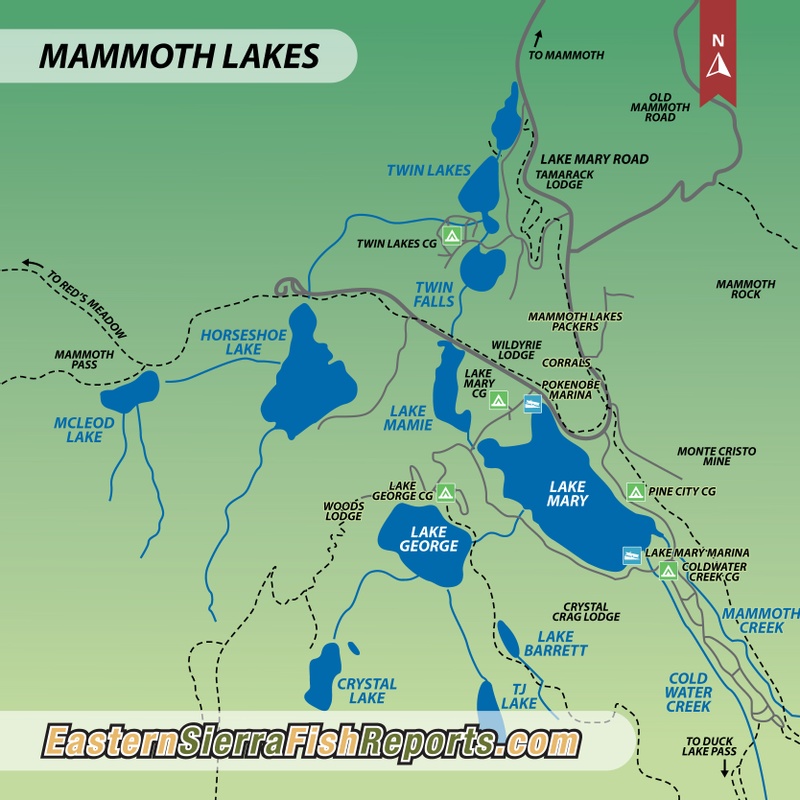Mammoth Lakes Fish Report for 7-23-2009
Mammoth Lakes Basin Fish Report- Update by Mark Spieler 7-19-09
Mammoth Lakes - Mammoth, CA (Mono County)

by The Trout Fitter Staff
7-23-2009
Website
Water Conditions:
Water temps are in the mid 50's to low 60's near the surface but get cooler as you go deeper.
The water is quite clear in all lakes.
Water conditions have been generally calm in the Lakes Basin into early afternoon as of late. Wind has been affecting Lower Twin Lakes more than the others.
Fishing conditions and Hatches: Good
Hatches: small midges early/late, Callibaetis in late mornings on the Twins.
Fish can be caught with stripping, dry, dry dropper or a stealthy indicator set up. Key is to find feeding fish.
The best fly fishing is still found in Mamie and the Twin Lakes. Lower and Middle Twin are best for fishing dry's and dry/dropper with Callibaetis, Adams or Black Gnats with Callibaetis nymph or small midge droppers.
Callibaetis are showing on all three of the Twin Lakes on calm mornings. Lake Mamie can be fished similarly to Twin. Use 5x or less, 9 ft or longer leaders. Target rising fish.
Alternatively, pull a Small bugger, Callibaetis nymph or both around the shallower drop offs. Keep tippet light.
Mary and George are fair for stripping but you can hook bigger fish. Use Buggers or Doc's TL Specials or Leach Patterns.
Lake Mary and George can also be fished with dry's in sheltered areas (for mostly smaller fish)
Flies:
NYMPHS- Callibaetis nymphs/emergers, Pheasant Tails #14-16. Zebra midges and the like #18 - 20.
DRY FLIES- Calibaetis duns, emergers, cripples, Adams, # 14 -16. Griffith\'s, Black Gnats, Midge and Mosquito patterns in #18-#22. Black Ants #16-#18.
STREAMERS- Sink tip or Full Sink Intermediate lines in Twins and Mamie, Type 3+ on George and Mary tugging Black or Olive Woolly Buggers, Doc's Twin Lakes Specials or Small Trout imitations as lead bug then 18-24 in dropper with Callibaetis nymph, small midge.. Also smaller leach patterns, Matukas, Hornbergs.
Guides Hint: Where you fish is very important to your success. Look for dropoffs or rapid changes in depth (where trout can lie in ambush), weed edges, other anglers on fish or rise forms to find the fish. Once you are on them, try to figure out their feeding habits and match those with the above techniques.
More Reports
The Trout Fitter Reports
for Thursday, July 9th, 2009
Mammoth Lakes : Mammoth Lakes Basin Fish Report- Update by Mark Spieler 7-9-09
Hot Creek: Hot Creek Fish Report- Update by Jon Carlton 7-4-09
San Joaquin River: San Joaquin River Fish Report- Updated by Jon Carlton 7/4/09
Crowley Lake: Crowley Lake Fish Report- Update by Kent Rianda 7-9-09
Owens River: Upper Owens Fish Report- Update by Jon Carlton 7-9-09
June Lake Loop: June Lake Loop Fish Report- Update by Josh Hevron 7-4-09
Owens River: Owens River Fish Report- Updated by Mark Spieler 7-4-09
Owens River: Lower Owens River Fish Report- Update by Pat Jaeger 7-4-09
Lee Vining Creek: Lee Vinning Creek Fish Report- Update by Josh Hevron 7-4-09
Rush Creek: Rush Creek Fish Report- Update by Josh Hevron 7-9-09
East Walker River (CA): East Walker River Fish Report- Update by Nate Wray 7-9-09
Bridgeport Reservoir: Bridgeport Reservoir Fish Report- Update by Eric \"Otis\" Hein 7-4-09
The Trout Fitter Reports
for Friday, June 12th, 2009
Mammoth Lakes : Mammoth Lake Basin Fish Report- Update by Eric
Hot Creek: Hot Creek Fish Report- Update by Jon Carlton 6-10-09
Crowley Lake: Crowley Lake Fish Report- Update by Kent Rianda 6-5-09
Owens River: Upper Owens Fish Report- Update by Gary Hooper 6-6-09
June Lake Loop: June Lake Loop Fish Report- Update by Nate Wray on 6-6-09
Owens River: Owens River Fish Report- Updated by Mark Spieler 6-11-09
Owens River: Lower Owens River Fish Report- Update by Josh Hevron 6-12-09
Lee Vining Creek: Lee Vinning Creek Fish Report- Update by Nate Wray 6-9-09
Rush Creek: Rush Creek Fish Report- Update by Dave Neal 6-6-09
East Walker River (CA): East Walker River Fish Report- Update by Dave Neal 6-12-09
Bridgeport Reservoir: Bridgeport Reservoir Fish Report- Update by Mark Spieler 6-11-09

Website Hosting and Design provided by TECK.net